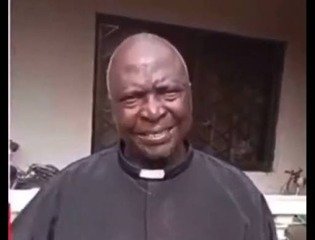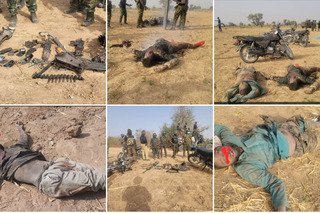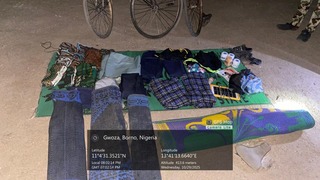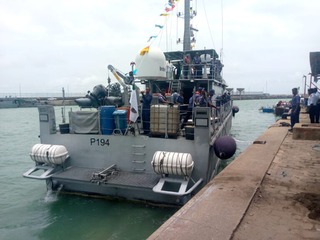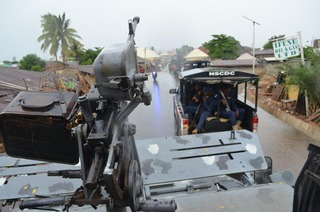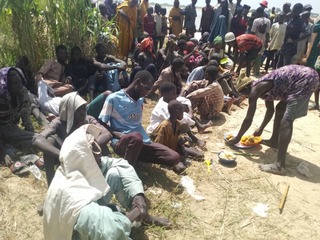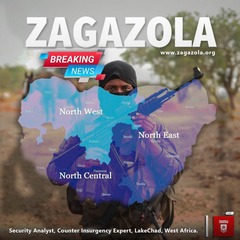Fraud and Mismanagement Rock INGO's IDP Cash Assistance Effort in Bama
By: Zagazola Makama
Corruption has recently undermined humanitarian efforts in Bama, located in the northeast of Borno State, where aid workers responding to the 13-year insurgency have been accused of fraud.
The International Organization for Migration (IOM) and Mercy Corps oversee a multi-purpose cash assistance (MPCA) program, providing financial aid to newly arrived internally displaced persons (IDPs) at Bama IDP Camp. This program aims to meet the basic needs of the refugees, alleviate their households' financial burdens, and guide them towards sustainable recovery.
Despite being designed to assist 1,000 selected IDPs, the program has been tainted by fraudulent activities carried out by humanitarian workers. This has led the United Nations to establish an investigative team to look into the accusations.
Here's how the issue unfolded:
From November 2023 to January 2024, the IOM compiled a list of 1,000 newly arrived IDPs to receive cash assistance and issued them tokens. However, during the distribution process, it was discovered that 83 IDPs had already departed the camp for Pulka, Banki, and Konduga to reunite with family, resulting in excess tokens.
An IOM volunteer, tasked with training women in tailoring, was given 50 of these surplus tokens to distribute under a covert arrangement with an IOM officer. This deal stipulated that each recipient would return 95% or 80% of the cash received. After compiling the list, it was sent to Mercy Corps for verification before the commencement of the cash distribution. Each beneficiary was to receive N91,030.
When the funds were disbursed, however, the IDPs who received tokens through the IOM volunteer were asked to return amounts between N86,000 and N70,000. This caused discontent among some IDPs, who felt cheated out of the full N91,030 they were entitled to.
Mr. Abdulrahman Busube, the Councillor of Bama, initiated an investigation after 33 IDPs complained of receiving only N20,000 or N5,000. Busube promptly reported the matter to the police, leading to the questioning of the IOM volunteer. The police found her with 42 tokens and N600,000, but she claimed to have received these from "Judith," an IOM staff member overseeing the program, for collecting the kickbacks.
Judith was summoned by the police but denied any involvement, despite the volunteer's insistence that she was acting under Judith's instructions. Alhaji Modu Ali Gujja, the Chairman of Bama, called for a thorough investigation.
On February 26, a five-member IOM team visited Bama to investigate the fraud allegations. They met with the camp coordination team and interrogated the accused volunteer, who stood by her story. Camp officials informed the investigators that numerous complaints had been received about IDPs being shortchanged and that some recipients of new arrival tokens were actually Bama community members, not IDPs.
During a subsequent emergency meeting at the UN Humanitarian Hub in Bama, which included various officials and two participants joining virtually from Maiduguri, Judith again denied distributing the 50 tokens.
However, the situation took a turn when some of the N600,000 recovered by Busube was misappropriated. While the investigation was ongoing, the Chairman directed the Councillor to distribute N5,000 to each of 92 new arrival IDPs and N10,000 to each of ten head of households. However, of the N600,000, Busube only presented N450,000, with N150,000 unaccounted for. When questioned about the discrepancy, Busube claimed he had used the funds to settle the police and shared N45,000 among his fellow councillors.
Busube maintained that some of the money was distributed to the police and the remaining was shared among the new arrivals and heads of households, with 92 new arrivals each receiving N5,000 and ten households each receiving N10,000.
This misappropriation came to light amidst the ongoing investigation into the broader corruption scandal within the humanitarian operations in Bama. The situation highlights not only the initial fraud committed by the IOM volunteer and potentially other staff members but also the subsequent mismanagement of recovered funds by a local official.
The case continues to be under scrutiny, with calls for accountability and transparency to restore integrity to the aid efforts in the region.


